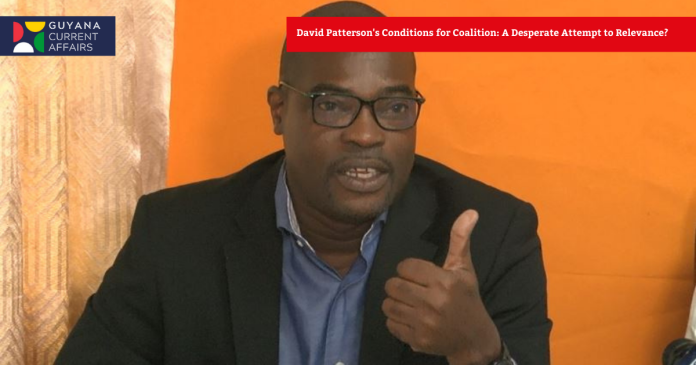The Alliance For Change (AFC) Chairman, David Patterson, has outlined specific conditions for reviving coalition talks with A Partnership for National Unity (APNU) ahead of the 2025 elections. These conditions include respect for the negotiation process, prioritizing national interests over personal gains, developing a joint political platform, and adhering to a March 31 deadline. This move is seen by some as a desperate attempt to maintain relevance in Guyana’s political landscape.
Background on AFC-APNU Coalition
The AFC and APNU have a history of coalition politics, having formed an alliance that won the 2015 general elections. However, they lost in 2020, and the AFC subsequently broke away from the coalition in December 2022. The current discussions are aimed at potentially reuniting the parties for the upcoming elections.
Patterson’s Conditions
Patterson’s conditions reflect a cautious approach to re-engaging with APNU. He emphasized the need for mutual respect and adherence to agreed terms, ensuring that national interests supersede personal ambitions. The AFC also seeks a clear, jointly developed political platform to present to the nation as an alternative to the current government.
Perception of Desperation
Critics view Patterson’s conditions as a strategic move to regain political leverage. By setting strict terms, the AFC may be attempting to demonstrate its commitment to principled politics and its willingness to engage in meaningful coalition-building. However, this approach also risks being perceived as inflexible or even desperate, particularly if APNU is not willing to meet these conditions.
Impact on Political Landscape
The outcome of these negotiations will significantly impact Guyana’s political landscape. If successful, a renewed coalition could pose a stronger challenge to the ruling PPP/C government. Conversely, failure to form a coalition might leave both parties vulnerable to electoral defeat, potentially altering the balance of power in Guyanese politics.
In summary, David Patterson’s conditions for a coalition with APNU reflect a complex interplay of political strategy and desperation. As the AFC seeks to maintain its relevance in Guyana’s political arena, the success of these negotiations will be crucial in determining the party’s future influence.


